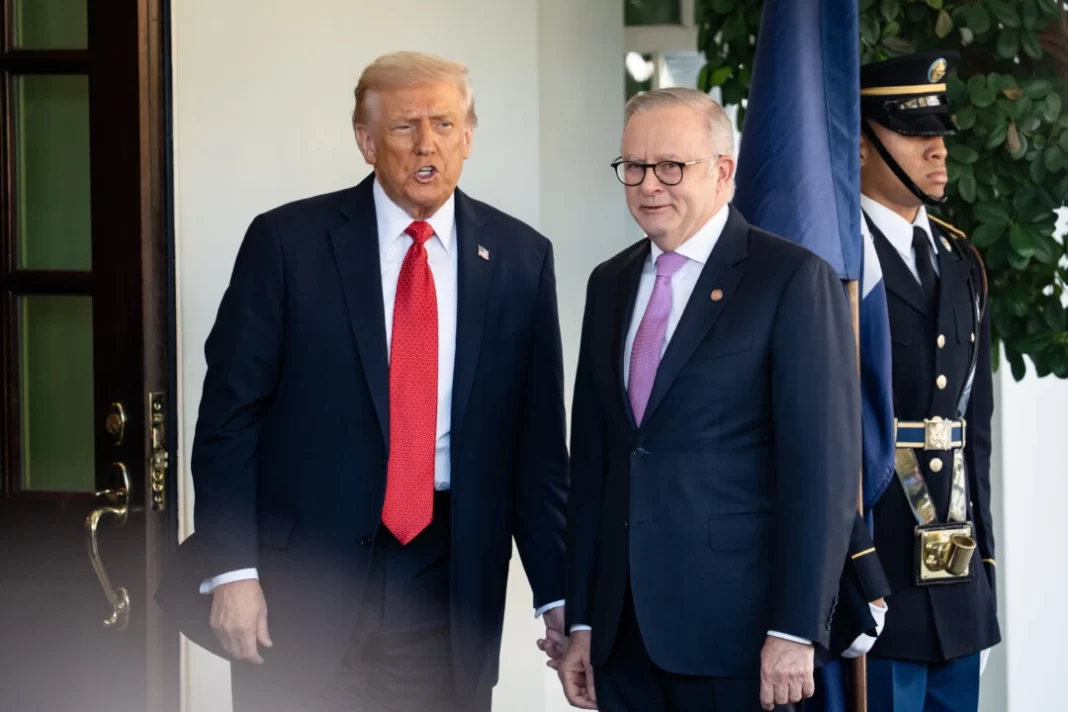EEUU. U.S. President Donald Trump and Australian Prime Minister Anthony Albanese on Oct. 20 signed a rare earths agreement at the White House, outlining plans for both countries to jointly invest more than $3 billion in critical minerals projects over the next six months.
The White House announced that recoverable resources from these projects are valued at an estimated $53 billion, as both countries work to counter China’s global dominance in the sector.
Trump on Oct. 20 welcomed Albanese to the White House for their first formal meeting to discuss a wide range of bilateral issues, including trade, defense, and the nuclear submarine partnership.
“We’ve been working on that for quite a while,” Trump said, referring to the rare-earth deal, as he hosted Albanese and his delegation in the Cabinet Room. “In about a year from now, we’ll have so much critical mineral and rare earths, and you won’t know what to do with them.”
He noted that the rare-earth agreement was finalized in four to five months.
As part of the rare earths deal, the Department of War will invest in the construction of a 100 metric ton-per-year advanced gallium refinery in Western Australia.
The deal comes as the Chinese regime has weaponized global supply chains in recent weeks by significantly expanding its export controls on rare earths and minerals. A day before the meeting, Trump again expressed his displeasure with Beijing’s actions.
“I don’t want them to play the rare-earth game with us,” Trump said on Air Force One on Oct. 19.
During the meeting, Albanese said that both countries agreed to mobilize government and private sector support, investing $8.5 billion in mining and processing of critical minerals and rare earths.
Under the new agreement, both sides will work to protect their domestic markets from “non-market policies and unfair trade practices.”
Decades of government subsidies and policy support have cemented China’s dominance over the rare-earth supply chain. It currently controls 60 to 70 percent of global rare-earth ores and more than 90 percent of refined materials and magnets, according to the International Energy Agency.
Albanese said the new deal will take the economic partnership between Australia and the United States to the “next level.”
“Today will be seen as a really significant day in our relationship,” Albanese told reporters.
Australia can supply 30 rare-earth minerals to feed demand in the United States, and its government established a strategic critical mineral reserve earlier this year worth approximately $780 million.
In August, Australian Ambassador to the U.S. Kevin Rudd said at a forum that Australia could be a “great power” in critical minerals and rare earths.
“We have the biggest mining industry and the largest mining companies in the world,” Rudd told the forum, hosted by the Center for Strategic and International Studies.
Australia needs U.S. support to help it process and refine critical minerals to compete with China.
Trump Endorses Nuclear Sub Deal
Albanese, 62, previously made a state visit to Washington in 2023 during the Biden administration.
One of the key topics on the agenda was the trilateral security partnership between Australia, the UK, and the United States, called AUKUS, which was formed in 2021 under the Biden administration.
Under the agreement, Australia will buy three Virginia-class hunter submarines by the early 2030s, with an option to buy two more.
The pact will also deliver a new submarine class, called the SSN-AUKUS, with the United Kingdom to produce the first vessel for the Royal Navy in the 2030s, and Canberra to deliver the submarine built in Australia to the Royal Australian Navy in the early 2040s.
Trump said the project, which had been moving slowly, is now advancing rapidly. He added that he is working closely with Albanese to push it forward and affirmed his support for the initiative amid earlier rumors he might cancel it.
“We have the best submarines in the world, anywhere in the world, and we’re building a few more, currently under construction,” Trump said.
Trump also said that he viewed AUKUS as a deterrent to China in the Indo-Pacific but believed it may not be needed.
“The United States is the strongest military power in the world by far,” he said. “It’s not even close. We have the best equipment, we have the best of everything, and nobody’s going to mess with that.”
In June, the Pentagon said that it would review the trilateral deal to determine whether it’s consistent with Trump’s current agenda.
The news quickly made headlines and sparked concern in Australia.
The partnership is “vital to deterring aggression by China in the region,” Sen. Jeanne Shaheen (D-N.H.), ranking member of the Senate Foreign Relations Committee, said in a statement, welcoming Trump’s endorsement.
“I was glad to see President Trump voice support for AUKUS, which is key to both America’s security and ensuring that the burden of collective defense is shared more broadly among partners and allies.”
According to the White House, Australia has invested $1 billion in expanding and modernizing the U.S. submarine industrial base since February and has committed to invest another $1 billion by the end of this year.
“Together, we are strengthening the Australia–United Kingdom–United States (AUKUS) trilateral security partnership to meet the challenges of tomorrow,” the White House fact sheet states.
Australia has also agreed to invest billions in defense equipment, including a $1.2 billion purchase of Anduril unmanned underwater vehicles.
In addition, the Trump administration has secured expanded market access for U.S. beef in Australia and commitment from the country’s superannuation funds to boost investments in the United States by $1 trillion by 2035.
Growing China Threat
Australia views China as an increasing threat.
During the meeting, Trump noted that Beijing is paying high tariffs to the United States. He also reiterated his plans to meet with Chinese Communist Party leader Xi Jinping soon.
“I think China has been very respectful of us,” Trump said, while highlighting the billions of dollars in tariffs paid by the communist country.
Existing 55 percent levies will increase to 155 percent if Xi and Trump don’t come to terms when the two meet in South Korea in the next two weeks.
“I expect we’ll probably work out a deal with President Xi of China,” Trump said. “It’s going to be very exciting. I think we’re going to work something out that’s good for both countries.”
Trump said the United States has leverage because domestic companies sell many airplanes, parts, and components to China.
“They threatened us with rare earths, and I threatened them with tariffs, but I could also threaten them with many other things, like airplanes,” Trump said. “You know about airplanes because they can’t get parts for their airplanes. We build their airplanes.”
He suggested China is in a losing position regarding trade.
“I believe that they’re in big trouble, and I don’t want them to be in big trouble,” Trump said.
Theepochtimes.com





































